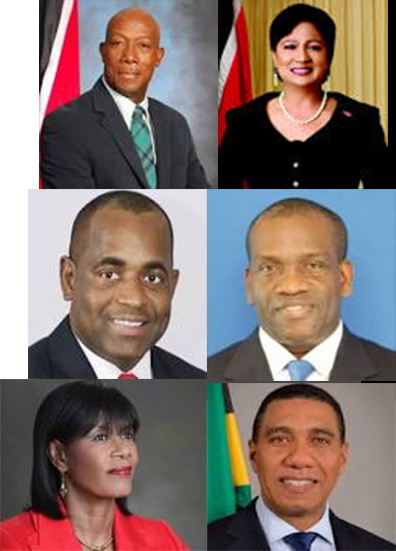
In recent times, we saw existence of the blame game in the twin-island Republic of Trinidad and Tobago between the ruling People’s National Movement, led by Prime Minister Keith Rowley, and the coalition People’s Partnership, led by former Prime Minister Kamla Persad-Bissessar who is also the leader of the United National Congress. It also exists in Dominica between the Dominica Labour Party, led by Prime Minister Roosevelt Skerritt, and the Lennox Linton-led United Workers Party; as well as in Jamaica between the Jamaica Labour Party, led by Prime Minister Andrew Holness, and the Portia Simpson-Miller-led People’s National Party.
It also existed and continues to exist in Guyana. It began during the early years between the People’s Progressive Party (PPP), which was led by Dr. Cheddi Bharat Jagan, and the People’s National Congress (PNC), led by Lynden Forbes Sampson-Burnham. Following their death in 1997 and 1985, respectively, it continued under the Presidency of the late Desmond Hoyte and Janet Jagan, as well as under Samuel Hinds, Bharrat Jagdeo, Donald Ramotar and now President Granger, who leads a coalition government.
However, before commencing a discussion on that CARICOM member state – St. Kitts and Nevis - this writer would like to remind/sensitise readers about what happens after elections in the United States of America from a historical perspective.
(Top) - PM Keith Rowley and Kamla Persad-Bissessar
(Middle) - PM Roosevelt (L) and Lennox Linton
(Bottom) - Portia Miller and PM Andrew Holness
US Transition of Power
Following the results of an election for the US presidency, the transition process will begin with the defeated candidate’s concession speech and will be followed by the victorious candidate delivering a speech that acknowledges his opponent’s graciousness.
According to a document published by the Embassy of the United States of America, headlined ‘What happens after Elections’, during the roughly 75-day period between election and inauguration of a new US President, “The outgoing administration briefs its successor on important national security, foreign affairs and other matters. This empowers the new president to make informed decisions upon taking office. It also helps the president-elect make personnel decisions about top-level officials...”
The document also addresses other expectations during the transition period.
“Transitions challenge any political system. In healthy democracies, fair elections and peaceful transitions demonstrate that today’s losers might be tomorrow’s winners. Winners and their supporters must remain responsive to the opinions of their rivals, keeping an eye on the next election cycle. Losers and their advocates can focus on present and future possibilities, rather than past resentments. Confident that the rules can work for them next time, they more easily accept the existing political order and do not resort to violence.”
St. Kitts & Nevis
The 101 square-mile twin-island Federation of St. Kitts and Nevis has an estimated population of just over 51,000. Currently, there are five political parties in the Federation: The St. Kitts-Nevis Labour Party (SKNLP), headed by former Prime Minister the Rt. Hon. Dr. Denzil Douglas; People’s Action Movement (PAM), headed by Deputy Prime Minister the Hon. Shawn Richards; People’s Labour Party (PLP), headed by Prime Minister Dr. the Hon. Timothy Harris; Concerned Citizen’s Movement (CCM), headed by Nevis’ Premier the Hon. Vance Amory; and the Nevis Reformation Party (NRP), headed by the Hon. Joseph Parry.
The following discussion is mainly about Federal Governments on St. Kitts but some references will be made about Nevis.
Founded in 1932, the SKNLP, initially known as the St. Kitts Workers League, was led by Sir Robert Llewellyn Bradshaw from 1946 until
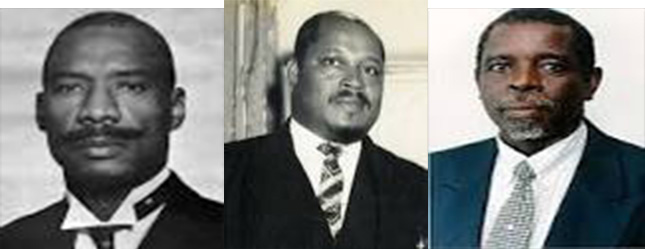
hisdeath on May 23, 1978. He was succeeded by Sir Caleb Azariah Paul Southwell who died on May 18, 1979 and the mantle of leadership was passed on to Sir Lee Llewellyn Moore who died on May 6, 2000.
Generally, the efforts of the Labour Movement from the 1940s to the 1960s had led to increased local inputs in the government decision-making process. These inputs were largely due to efforts of the Bradshaw-led SKNLP, which culminated in Associated Statehood in 1967.
Some Legacies of the Bradshaw Government
During Bradshaw’s tenure as Leader of the SKNLP and Political Leader of the Federation, his Administration had implemented a number of positives which were inherited by their successors.
(L-R) - Robert L. Bradshaw, C.A. Paul Southwell and Lee L. Moore
Listed below are some of Bradshaw’s legacies:
1. Establishment of clinics around the island to the point where St. Kitts was a model used for small states globally, insofar as a clinical system in healthcare;
2. An education system that opened the door to high school and university for poor people;
3. Construction of the international airport and seaport;
4. Opening and development of Frigate Bay;
5. Establishment of the Industrial Site at Bird Rock, Ponds Pasture and Sandy Point, where shoes and light were manufactured, as well as the largest electronics assembly industry in the Eastern Caribbean and the development of a successful apparel assembly industry;
6. Building of the JNF General Hospital;
7. Diversification of the economy through the Ancillary System of crop production, in which different entities were engaged in activities such as producing peanuts for exportation and other things so that sugar workers could grow food on government lands to generate revenue;
8. Infrastructural projects such as construction and maintenance of roads, providing potable water and energy;
9. The setting up of a special Reserve Fund for sugar workers;
10. A number of progressive Workers’ Right legislations, including the holiday with pay Act, and the Industrial Environment legislation;
11. Passing of the National Carnival Act;
12. Following the losses of revenue in sugar production due to the introduction of beet in Europe, the government turned to tourism, whereby the nation had seen the establishment of the Ocean Terrace Inn, Golden Lemon, Sea View Inn, Banana Bay and the Cockle Shell Bay;
13. Commencement of the campaign for sugar lands to irrevocably remain State property; and
14. The platform to carry the country to independence.
The People’s Action Movement
Sir Kennedy Alphonse Simmonds, the only living National Hero of St. Kitts and Nevis, is one of the co-founders of the PAM, which was founded in 1965. In 1976, he was elected President of the PAM.
Following Bradshaw’s death, the seat for Central Basseterre (Constituency Number Two) was left vacant and Simmonds presented himself as PAM’s candidate in that by-election which was held in January 1979.
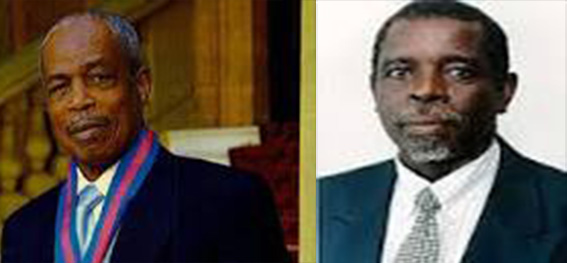
In that by-election, Anthony Ribeiro of the SKNLP was declared winner by a margin of 13 votes with 99 rejected/spoilt ballots. Not satisfied with the count, Simmonds filed an Election Petition in which he asserted that valid votes were wrongfully rejected as spoilt ballots by the Returning Officer. A recount in open Court was ordered by Justice Hewlett and it was determined that Simmonds was the victor.
This incident occurred under the Lee Moore Administration and, as claimed by the PAM, he announced a snap General Election with the hope of regaining Constituency Number Two.
The Election was held on February 18, 1980 and saw the SKNLP gaining the majority votes but only four candidates were elected. The remaining seats Dr. Dr. Kennedy A. Simmonds (L) and Lee L. Moore were won by the PAM and Simmonds quickly entered into a coalition with the NRP and formed the new Government.
Some of PAM’s Major Accusations
While in office, PAM had accused the SKNLP of gross victimisation and its dictatorial approach to policies, especially under Bradshaw’s leadership. The party also claimed that the Labour Union was an imposition on people because it was a tool of the SKNLP, which caused many of them not to become members.
PAM further claimed that while the Labour Union may have been a good thing for the country and its inhabitants, it became politicised and people who were not supportive of the SKNLP were deprived of proper union representation.
The party also made reference to what it claimed to be the dictatorial attitude of Bradshaw when his Government had ordered Dr. Simmonds to desist from engaging in food cultivation on a plot of land at West Farm Estate and given a directive to plant sugar cane, which was purportedly in keeping with the Government’s ongoing Sugar Industry Rescue Operation.
Following his objection, the party claimed that Dr. Simmonds was arrested and placed in a cell, but was bailed some hours later and subsequently vindicated.
The party further accused the Bradshaw Government of abuse of power following Simmonds’ vindication when it declared a one-mile State of
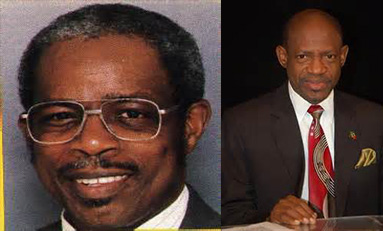
Emergency in the area of his farmlands, which resulted in suspension of the Constitution and the nullification of the Court’s decision.
There were many other areas in which the PAM had levelled accusations at the SKNLP, but no credit was given to its predecessor for the policies and projects it inherited that led to economic growth.
Some of PAM’s Legacies inherited by the SKNLP
Federal Elections were held on November 29, 1993 and although the SKNLP had gained the most votes, neither party had won the majority of seats. Both parties had each won four seats while on Nevis, the CCM had won two and the NRP one. Neither the CCM nor the NRP had decided to form a coalition Government with either political party on St. Kitts, thus the PAM remained in office. Dr. Kennedy A. Simmonds (L) and Dr. Denzil L. Douglas
Constituents were again called to the polls on July 3, 1995, which resulted in the Dr. Douglas-led SKNLP winning seven seats and the PAM one, while CCM took two and NRP one on Nevis. Since then, the SKNLP had remained in office until February 2015.
Listed below are some of the inherited Legacies:
1. The removal of personal income tax (Pay as you earn – PAYE);
2 Establishing of the School Meals Programme;
3 Introduction of the Free Books Programme to schools;
4 Allowing students who became pregnant to return to school;
5 Expansion on Social Security benefits, including maternity leave;
6 Changing of the Illegitimate Child Concept;
7 Acquisition of independence from the British;
8 Establishing of the Citizenship by Investment Programme;
9 Purchasing of sugar lands from planters in order for nationals to own piece of the rock;
10 Construction of Port Zante; and
11 Construction of the Southeast Peninsula Road (Kennedy Simmonds Highway).
Some of SKNLP’s Major Accusations
Like the SKNLP, PAM was accused of victimisation. The party was also accused of corruption, the lack of law and order and not having legislation for Integrity in Public Life.
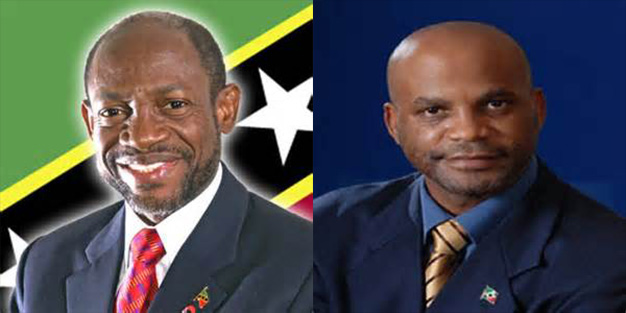
There was also the accusation of political decision-makers, their relatives and their friends being involved in criminal activities.
The SKNLP claimed that the country’s economy was based on money laundering and was labelled ‘Devil’s Island” by Western societies. It also accused the PAM Administration of not providing opportunities to young people and failed to take up scholarships offered by the Cuban Government.
The SKNLP also claimed that between 1984 and 1995, the Citizenship by Investment Programme was controlled by the late Dr. William ‘Billy’ Herbert, and that the PAM Administration had allegedly covered up the incidents of a riot and fire at Her Majesty’s Prison, as well as failing to conduct an in-depth investigation into the disappearance of Billy Herbert.
Dr. Denzil L. Douglas (L) and Lindsay F. Grant
As was done by the PAM Administration, the SKNLP failed to give credit to its predecessor for the positives inherited.
Some Legacies of the Douglas Administration
1. Revamping of the Citizenship by Investment Programme;
2. Structural improvements to Port Zante;
3. Construction of the Kim Collins Athletics Stadium;
4. Upgrading of the JNF Hospital, including construction of the Intensive Care Unit, upgrading of Eye Clinic and the Accident and Emergency Department, and introduction of the Emergency Medical Services;
5. Provisions for HIV/AIDS treatment;
6. Granting of scholarships to study in Cuba, Mexico, USA and University of the West Indies;
7. Low interest student loans;
8. Increase in the number of manufacturing plants;
9. Renovation of the RLB Airport;
10. Introduction of international flights, including American Airline flights from New York and Miami, British Airways from Gatwick, Air Canada from Toronto, US Airways from North Carolina and Delta from Atlanta;
11. Construction of the Warner Park Cricket facility;
12. Housing .Programme for first time owners in which over 5,000 were built;
13. Country with the highest minimum wage in the Caribbean region;
14. Legislation for equal pay for both sexes;
15. Establishing the People’s Empowerment Programme (PEP) in which some 3,000 young people were employed and a number of them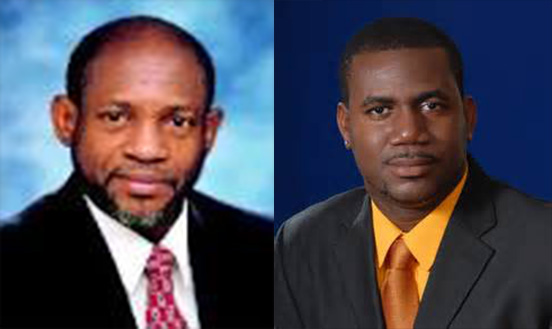 trained in 20 disciplines;
trained in 20 disciplines;
16. Transition of a sugar-based economy to that of tourism and services;
17. Construction of the St. Kitts Eco Park and hotels, including the St. Kitts Marriott Resort and Beach Casino, Imperial Bay Resort and Residences, Silver Reef, Kittitian Hill Resort. Commencement of the construction of Park Hyatt and other Christophe Harbour Projects, Koi Resort and Residences, Imperial Bay Resort and Condominiums, T-Loft, Heldens, Golden Rock and The Castle;
18. Pioneering of Renewable Energy. Solar Farm at RLB Airport and on the broad to Frigate Bay;
19. Technological advancements;
20. Introduction of Wi-Fi in high schools and the establishment of Computer Laboratory in all schools, as well as introduction of the One-to-One Lap Top Programme;
21. Following the global financial crisis that started in 2008, the Federation Dr. Denzil L. Douglas (L) and Shawn K. Richards attained the number one position in economic growth within the OECS with a growth rate of 3.8% in 2013 and 4.6% in 2014;
22. Reducing the National Debt from nearly 200% to 60%;
23. Commencement of construction of new building for Solid Waste Management Corporation; and
24. Commencement of a Tunnel at Timothy Hill.
Some of Team Unity’s Major Accusations
After some 20 years in office, the Dr. Douglas-led SKNLP was defeated in the February 16, 2015 Federal Elections by Team Unity, an alliance of the PAM, the PLP and the CCM. The PAM won four seats, the PLP one and the CCM two, while the SKNLP won three and the NRP one.
Members of the Team Unity Administration had accused the SKNLP Government of victimisation, cronyism and nepotism. They also accused Dr. Douglas of dictatorial practices as Political Leader of the Federation and that the Citizenship by Investment Programme was compromised, as there was no accountability for the funds accrued.
The SKNLP was further accused of incurring a National Debt of almost EC$3B and that there was no accountability for finances accrued by the Sugar Industry Diversification Fund (SIDF). Team Unity claimed that monies from the SIDF were used as a “slush fund”, while the PEP was an unsustainable programme conceived to conceal the rising unemployment among young people.
Team Unity further claimed that the SKNLP had abused parliamentary procedures, politicisation of the Civil Service and the Police Force, as well as orchestrating the Motion of No Confidence against Dr. Douglas not to be tabled in Parliament.
Additionally, the SKNLP was accused of introducing Value Added Tax (VAT) without consultation and having it speedily implemented; wastage of taxpayers’ money on a failed La Valle Project; arranging the Land for Debt Swap deal; having no effective strategy for dealing with the crime situation that saw the Federation being labelled “Murder Capital of the World” per capita with 35 homicides in 2011; the Basseterre High School’s Health Issue; the withdrawal of visa-free access to Canada; and the payment of over EC$135,000 in medical expenses for Senator Nigel Carty.
Some of Team Unity’s Achievements
Since taking office in February 2015, the Team Unity Government had achieved the following:
1. Removal of VAT from food, medicine and funeral expenses;
2. Payout of EC$16M to former sugar workers;
3. Provided budgetary support of EC$25M to Nevis;
4. Ending the shift system at the Basseterre High School by building a temporary structure;
5. Establishing an Oncology Unit at the JNF Hospital;
6. Establishing an e-Government Portal;
7. Refurbishment of the Mary Charles Hospital in Molineaux;
8. Re-calibrating and resuscitating the CBI programme;
9. Rationalising and restructuring of the PEP programme into a sustainable agency;
10. Economic growth of 3.02% in 2016;
11. Initiating the Fresh Start Programme; and
12. Completion of the Tunnel Project at Timothy Hill.
Team Unity
Some of SKNLP’s Major Accusations
With just under two years in office, the Team Unity Government has been accused of sacking a number of civil servants who are known SKNLP supporters and also those perceived to be supporters of that party. The Administration is also accused of victimisation, graft, nepotism, corruption and, most recently, conflict of interest.
The SKNLP has also accused the Team Unity Administration of electing a Speaker of the National Assembly in the Hon. Michael Perkins, who the party claims demonstrates his partiality for the Government by not allowing members on the Opposition Benches to properly represent their constituents in Parliament.
The Opposition further accused the Team Unity Administration of unfulfilled promises made to the nation during its election campaign, which include $500 SIDF-funded family support grant for households earning $3,000 or less per month; providing equal access to state-owned media to all political parties; tabling of the Freedom of Information Act; and the passing legislation and regulations including Integrity in Public Life and Anti-Corruption Laws that require public officials to disclose assets and sources of funds.
With regards to the Federation’s crime situation, the SKNLP claimed that while in opposition, members of Team Unity had laid the blame squarely at the feet of Prime Minister Douglas and that the Hon. Mark Brantley publicly stated that they have the solution. But, to date, there is no change as some 50 homicides have been recorded since the tri-party took office.
The party has also accused the Prime Minister of allegedly shirking his responsibilities as the Minister of National Security by publicly stating: “The buck stops with him [Commissioner Queeley]...”
Conclusion
There is no doubt that most, if not all, political parties in the Caribbean are engaged in the blame game. The blame game starts from the very first day a political party rises to power and it increases as time goes by, especially when the new government fails to fulfil promises it said would be addressed immediately upon taking office.
When compared to the US, there is a very short period in the transition of power within the Caribbean region. While the US transition period is approximately a few days shy of three months, within which time the outgoing administration briefs its successor on important national matters, in the Caribbean this period takes just a few days and the successor is not briefed.
Maybe Caribbean politicians do not want to implement the US system because of the fear of outgoing administrations burning and or removing sensitive documents that could implicate them in acts of bad governance, including misfeasance.
Following elections in the Caribbean, it is unlikely for one to hear that incumbents who lost had gracefully and peacefully relinquished power. It is said that if this were done, the outgoing parties could emerge with their dignity intact and might possibly be victorious in future elections through that example. On the other hand, as suggested in the US Embassy’s document, “By reaching out to and showing respect for their political opponents, winning candidates help bridge differences and minimize the potential for conflict that can undermine democracy.”
From the Caribbean perspective, this writer strongly believes that the blame game tends to exacerbate conflicts among politicians and their supporters. There is also the view that following every election, the Caribbean region takes a backward step in the global socio-economic standings while other countries gain momentum. And this comes about because of the ‘tit-for-tat behaviour of politicians, among a number of other frivolities.
While it is a fact that some parties do engage in acts of corruption when in office, this writer would like to suggest that instead of their successors dwelling on lamentations at every given opportunity, they should launch formal investigations and, based on evidence beyond reasonable doubt, prosecute all those who are culpable.
Newly-installed governments need to concentrate their energy on Nation Building. There are a number of ways in achieving that goal, and one of them is to empower the Private Sector. Another one, which to this writer’s mind is of utmost importance, is for governments to establish Public/Private Partnerships with nationals.
For St. Kitts and Nevis to achieve sustainable economic growth there must be an end to political and public polarisation. Too often governments have been accused of victimising people who did not support them in elections. It must be remembered that even though one might not have voted for a party in government, the government was duly elected to manage the affairs of the country for all of it citizens and not for just those who openly support it.
Governments are elected by citizens to protect them by maintaining law and order through legislation; to be responsible for their welfare, including health and education; and to efficiently manage the economy in order to achieve growth and development. They are not elected to be masters, but servants of the people and they must be held accountable to the people for whatever they did, what they are doing and what they intend to do.
Should governments in the Caribbean region work assiduously to fulfil their mandate by taking cognisance of the fact that they were elected to serve all the people, definitely opposition parties could remain in opposition for decades.
Ironically, this writer found that while the PAM was in office, the SKNLP had deemed the road that leads to the Southeast Peninsula a highway to nowhere and the pier at Port Zante an engineering disaster. Today, we see developments in the Southeast Peninsula and also the massive development of Port Zante, which astronomically contributes to Tourism – the strongest driver of the Federation’s economy. Both areas of development were orchestrated by the SKNLP, which were inherited. And this inheritance is now passed on to the Team Unity Administration.
Therefore, why is it that citizens always hear of the blame game and not of credit being given to predecessors for the favourable policies and prosperous projects inherited?
Don’t you think it is time Politicians move away from the Blame Game and place more emphasis on Nation Building?